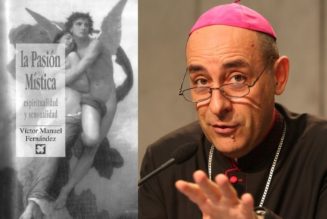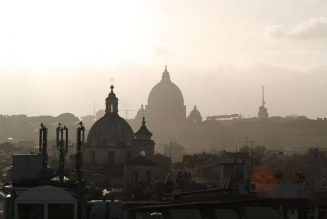ROME – Following in the footsteps of his predecessors, Pope Francis on Thursday released a document reflecting on the life and work of Italian poet Dante Alighieri, calling him a prophet of hope in a historic moment where inhumanity and lack of prospect loom large.
“At this particular moment in history, overclouded by situations of profound inhumanity and a lack of confidence and prospects for the future, the figure of Dante, prophet of hope and witness to the human desire for happiness, can still provide us with words and examples that encourage us on our journey,” Francis wrote in the closing lines of Candor Lucis Aeternae (“Splendor of Light Eternal”).
Dante, Francis writes, has an important message to convey, one that is meant to touch the hearts and minds of all, and still in present time has the ability to inspire change and transformation. The message his tale tells should help appreciate “who we are and the meaning of our daily struggles to achieve happiness, fulfilment and our ultimate end, our true homeland, where we will be in full communion with God, infinite and eternal.”
His prophetic mission, the pope writes, entailed denouncing those believers – from popes to ordinary faithful – who betray Christ and turn the Church into an instrument to advance their own interests, idolizing power and riches while ignoring the Beatitudes and the duty of charity towards the defenseless and the poor.
“Yet, even as he denounces corruption in parts of the Church,” Francis writes, Dante also “an advocate for her profound renewal and implores God’s providence to bring this about.”
Francis’s latest apostolic letter is the latest of a long list of papal documents and reflections on the author of The Divine Comedy, who died 700 years ago.
According the pontiff, Dante does not want “merely to be read, commented on, studied and analyzed,” but instead wants to “be heard and even imitated,” inviting the reader to become his companions on his journey through Inferno (Hell), Purgatorio (Purgatory), and Paradiso (Heaven).
“He wants to show us the route to happiness, the right path to live a fully human life, emerging from the dark forest in which we lose our bearings and the sense of our true worth,” the pope writes. “Dante’s journey and his vision of life beyond death are not just a story to be told; they are more than the account of a personal experience, however exceptional.”
RELATED: 700 years after his death, Dante still inspires popes
Candor Lucis Aeternae includes reflections both on Dante’s life and his most famous work.
Born in 1265 in Florence, the poet held important public offices. In 1302, as a result of political unrest, he was exiled for two years, banned from holding public office and forced to pay a fine. The pontiff notes that Dante rejected the decision as unjust, which only made his punishment more severe: Perpetual exile, confiscation of his goods and a death sentence if he returned to Florence.
“This was the beginning of Dante’s painful exile and his fruitless efforts to return to his native city, for which he had passionately fought,” Francis wrote, noting he became a “pensive pilgrim” reduced to a state of “grievous poverty.”
“Dante, pondering his life of exile, radical uncertainty, fragility, and constant moving from place to place, sublimated and transformed his personal experience, making it a paradigm of the human condition, viewed as a journey – spiritual and physical – that continues until it reaches its goal,” the pope noted.
He then praises the writer because, despite all the “tragic, sorrowful and distressing” events he experienced, he never “surrendered or succumbed” and refused to “repress his heart’s yearning for fulfilment and happiness or to resign himself to injustice, hypocrisy, the arrogance of the powerful or the selfishness.”
Francis said that instead, Dante discovered his own vocation and mission, emerging not as “an apparent failure, a sinner, disillusioned and demoralized, but a prophet of hope.”
Follow Inés San Martín on Twitter: @inesanma
Join Our Telegram Group : Salvation & Prosperity













